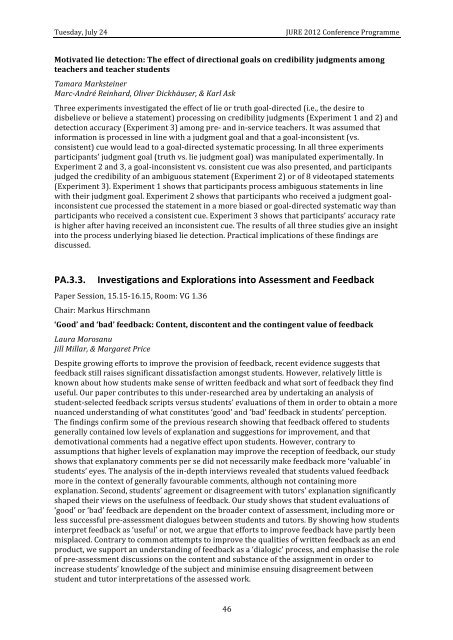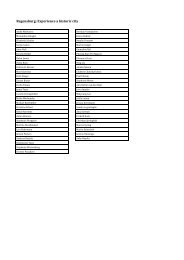JURE 2012 Programme book - EARLI Jure 2012
JURE 2012 Programme book - EARLI Jure 2012
JURE 2012 Programme book - EARLI Jure 2012
Create successful ePaper yourself
Turn your PDF publications into a flip-book with our unique Google optimized e-Paper software.
Tuesday, July 24 <strong>JURE</strong> <strong>2012</strong> Conference <strong>Programme</strong><br />
Motivated lie detection: The effect of directional goals on credibility judgments among<br />
teachers and teacher students<br />
Tamara Marksteiner<br />
Marc-‐André Reinhard, Oliver Dickhäuser, & Karl Ask<br />
Three experiments investigated the effect of lie or truth goal-‐directed (i.e., the desire to<br />
disbelieve or believe a statement) processing on credibility judgments (Experiment 1 and 2) and<br />
detection accuracy (Experiment 3) among pre-‐ and in-‐service teachers. It was assumed that<br />
information is processed in line with a judgment goal and that a goal-‐inconsistent (vs.<br />
consistent) cue would lead to a goal-‐directed systematic processing. In all three experiments<br />
participants' judgment goal (truth vs. lie judgment goal) was manipulated experimentally. In<br />
Experiment 2 and 3, a goal-‐inconsistent vs. consistent cue was also presented, and participants<br />
judged the credibility of an ambiguous statement (Experiment 2) or of 8 videotaped statements<br />
(Experiment 3). Experiment 1 shows that participants process ambiguous statements in line<br />
with their judgment goal. Experiment 2 shows that participants who received a judgment goal-‐<br />
inconsistent cue processed the statement in a more biased or goal-‐directed systematic way than<br />
participants who received a consistent cue. Experiment 3 shows that participants’ accuracy rate<br />
is higher after having received an inconsistent cue. The results of all three studies give an insight<br />
into the process underlying biased lie detection. Practical implications of these findings are<br />
discussed.<br />
PA.3.3. Investigations and Explorations into Assessment and Feedback<br />
Paper Session, 15.15-‐16.15, Room: VG 1.36<br />
Chair: Markus Hirschmann<br />
‘Good’ and ‘bad’ feedback: Content, discontent and the contingent value of feedback<br />
Laura Morosanu<br />
Jill Millar, & Margaret Price<br />
Despite growing efforts to improve the provision of feedback, recent evidence suggests that<br />
feedback still raises significant dissatisfaction amongst students. However, relatively little is<br />
known about how students make sense of written feedback and what sort of feedback they find<br />
useful. Our paper contributes to this under-‐researched area by undertaking an analysis of<br />
student-‐selected feedback scripts versus students’ evaluations of them in order to obtain a more<br />
nuanced understanding of what constitutes ‘good’ and ‘bad’ feedback in students’ perception.<br />
The findings confirm some of the previous research showing that feedback offered to students<br />
generally contained low levels of explanation and suggestions for improvement, and that<br />
demotivational comments had a negative effect upon students. However, contrary to<br />
assumptions that higher levels of explanation may improve the reception of feedback, our study<br />
shows that explanatory comments per se did not necessarily make feedback more ‘valuable’ in<br />
students’ eyes. The analysis of the in-‐depth interviews revealed that students valued feedback<br />
more in the context of generally favourable comments, although not containing more<br />
explanation. Second, students’ agreement or disagreement with tutors’ explanation significantly<br />
shaped their views on the usefulness of feedback. Our study shows that student evaluations of<br />
‘good’ or ‘bad’ feedback are dependent on the broader context of assessment, including more or<br />
less successful pre-‐assessment dialogues between students and tutors. By showing how students<br />
interpret feedback as ‘useful’ or not, we argue that efforts to improve feedback have partly been<br />
misplaced. Contrary to common attempts to improve the qualities of written feedback as an end<br />
product, we support an understanding of feedback as a ‘dialogic’ process, and emphasise the role<br />
of pre-‐assessment discussions on the content and substance of the assignment in order to<br />
increase students’ knowledge of the subject and minimise ensuing disagreement between<br />
student and tutor interpretations of the assessed work.<br />
46



